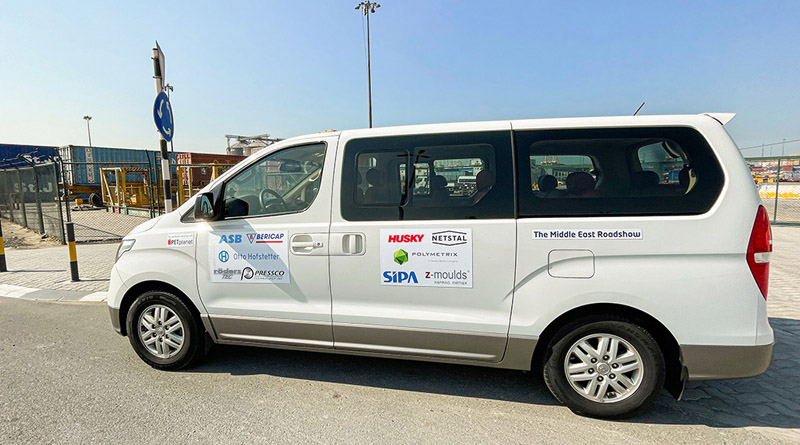The first meetings and traffic that takes some getting used to
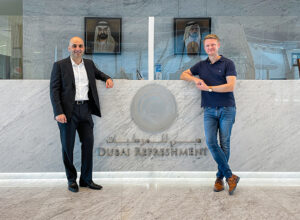
Today, Tuesday 5 December, my route takes me to the Pepsi bottler Dubai Refreshment in the Dubai Investment Park 2 industrial estate, around 30 km from my flat in Business Bay. Motivated, I drive our UAE Editourmobil towards the motorway, which is only a few minutes away from my home. So far so good. Once on the highway, however, I quickly realise that driving here is obviously very different to what I had expected. People overtake on the multi-lane road on both the right and left, people tailgate, honk, slow down, pull in and speed limits seem to be just a guideline. I have to concentrate hard to make sure I don’t miss any of the actions of other road users. I quickly get the feeling that there is little or no consideration for each other here and that whoever fights for their place wins. Indicating that you are about to change lanes is skilfully ignored; the only thing that helps is to adapt to the situation and simply change lanes yourself. This is completely contrary to my driving training and my driving style, which I consider to be defensive and considerate.
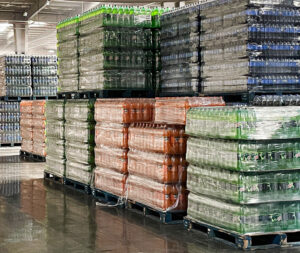
Visibly stressed, I finally reach the industrial estate after around 40 minutes, where I relax again as I enter the quiet Dubai Refreshment site. This is where I have an appointment with Mr Wael Nehme, VP Supply Chain & Projects. He has been with the Pepsi Bottler since 2001 and is now responsible for the entire supply chain, from procurement and production to warehousing and logistics. Sustainability projects and the planning and commissioning of the new factory where we are located are also part of his remit, as the company relocated here from another, smaller site in 2016. After an interesting conversation, I take a look at the factory, a US$200 million investment with enough infrastructure for expansion, as I learn (and see). On the way back to the city, it’s the same game again: I’m forced to fight my way through the traffic. Can I get used to it here? We’ll see. Back at the flat in Business Bay, I decide to go to a restaurant in a brew pub in the early evening. Once there, I unfortunately discover that there are no local beers or even craft beers, but rather only the well-known international brands, which I usually avoid as they are somewhat tasteless on my palate. At least I’m happy with a Brewdog and some really great finger food while watching a football match.
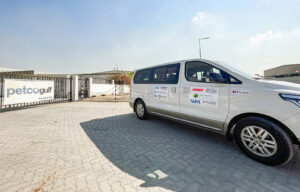
The following day, after a sensational cappuccino and world-class croissant at a nearby hotel, I’m back on the street, this time on my way to Petcogulf, a bottle manufacturer for beverage, food and non-food applications. In addition to the traffic, which once again felt completely crazy to me, I realise when I enter the Jebel Ali Free Zone, the name of the free trade port in whose area the company is located, that I am not allowed to go through. It’s not entirely clear why, somehow it’s because of my vehicle. I was told to take a different gate (the “gates” are multi-lane passing points reminiscent of toll entrances and exits). Okay, so I turn around, get back on the motorway and look for the other entrance. Once there, I’m told that I’m not allowed to enter the area with the van at all. I’m still not sure why. I wonder if I have confirmation of access. Of course I don’t have one and I insist, pointing to my meeting, for which I’m already a bit late anyway. This is then immediately recognised by the guard and I am allowed to drive. Strange, but I’m in. Shortly afterwards, I reach Petcogulf and am already sitting at a table with my contact Aswin Puthran, the GM, and he explains to me everything that is produced here. The company relies almost exclusively on single-stage production and produces rPET bottles for a juice bottler, as well as for cosmetics and household cleaners.
Back home in the afternoon – this time I got stuck in a few minor traffic jams – I sit down to write up my first interview and round off the evening in a very nice restaurant right on the waterfront with a view of the Burj Khalifa.
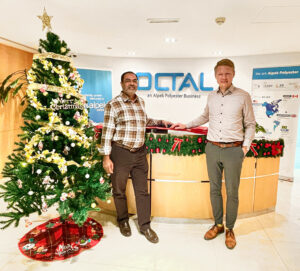
It’s Thursday. Today I’ve been invited to the material producer Octal. The company, which was acquired by Alpek Polyester in 2022, produces DPET for sheet applications as well as PET for bottle production on a large scale. Here I also meet Prashant Boloor, an ex-Reliance employee who is now the Senior Sales Director & Head of Sales for PET resin, as well as Mustafa Deraiya, Resin Technical Sales and the VP Middle East, Ricardo Gutiérrez. The farewell photo in front of the Christmas tree at reception makes up a little for missing the pre-Christmas period in Vienna, where I live. The return journey is another disaster, a small lorry almost hits me in the passenger side on the highway and only my long honking of the horn probably prevents worse.
In the evening, I try out a nearby Italian restaurant with an extremely good Google rating and eat a pizza that tastes so incredible that I have to say it’s probably the best pizza I’ve ever had!
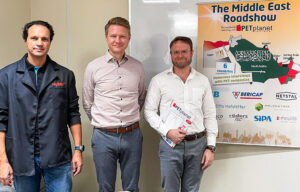
The week concludes on another high note. This morning I quickly took care of various things that had been left behind and am now on my way to Husky who have their local office near the airport. I have an appointment here with Philip Parubets, GM for Business Development, and Abdallah El Kharboutly, GM Middle East. I was later joined by Zaher Azzam, Regional Manager of Middle East Turkey and Afghanistan. I not only find out where Husky is represented in the market here, but also what the machine and tooling manufacturer manages in the region from here. The local team of 13 people is committed to providing outstanding sales and service in almost all countries in the region, plus countries in Africa, Australia-Oceania, Asia, and Europe with local teams in the respective countries. The supplier is the clear market leader in the UAE. More on this later in PETplanet Insider!
For now, I bid you farewell and prepare for a weekend of intensive writing.
Yours,
Kay Barton

